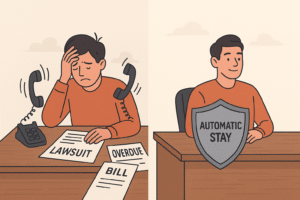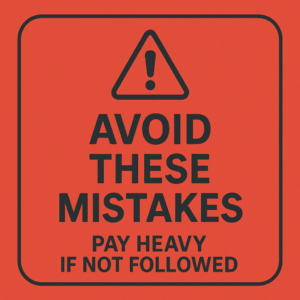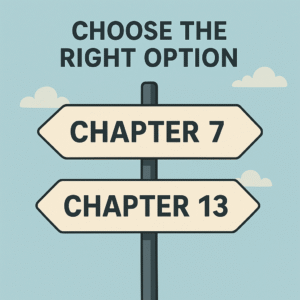
I understand that the toughest part for you isn’t just the overwhelming debt—it’s the relentless harassment that comes with it. This threat often feels more daunting than the debt itself. Creditors aren’t just after their money; they invade your peace of mind as well.
And while debt collection laws are supposed to protect you, creditors and collectors often push the limits or simply ignore the rules.
But when you file for bankruptcy, the court issues something called an automatic stay.
It doesn’t just slow the harassment—it stops phone calls, lawsuits, garnishments… all of it has to end, the same day you file.
In this blog, we’ll show you step-by-step how it works in practice, what the real PROTECTION looks like and what mistakes you shouldn’t make while filing bankruptcy. Keep Reading!
Why the Calls Keep Coming Despite Debt Collection Laws
On paper, you already have protection.
- The Fair Debt Collection Practices Act (FDCPA) is a federal law that prohibits harassment, threats, and unfair collection tactics.
- California adds an extra layer with the Rosenthal Fair Debt Collection Practices Act, which extends those protections to cover original creditors, not just third-party collectors.
So, the endless calls, late-night voicemails, relentless texting, and aggressive letters shouldn’t happen.
However, creditors often disregard these rules. They know the burden is on you to file a complaint or lawsuit. The result? More stress. Damaged credit from aggressive reporting. Constant fear of lawsuits or wage garnishments.
That’s where bankruptcy changes everything.
Unlike FDCPA/Rosenthal, creditors can’t ignore it… Violating the stay can trigger court sanctions and fines.
The moment you file, the automatic stay is a court order. Calls, lawsuits, foreclosures, wage garnishments, etc… they have to stop immediately.
Because the federal bankruptcy law puts the full weight on your side.
Step-by-Step: How Bankruptcy Stops Creditor Harassment
Here’s how it works after filing for bankruptcy:
Step 1: Understand the Automatic Stay
A court order that forces creditors to stop all collection efforts the moment you file. It stops all kinds of halt calls, texts, letters, lawsuits, wage garnishments, bank levies, repossessions, and foreclosure steps.
Now, for creditors, harassment is illegal. They get notice the same day you file or within 1-3 days
Some things aren’t stopped (like child support, certain criminal matters, or limited repeat-filing situations). Your attorney will flag any exceptions upfront.
Step 2: Choose the Right Chapter for Protection
But it’s crucial to know which chapter of bankruptcy will be suitable for you…
So, Chapter 7 can wipe out unsecured debt (credit cards, medical bills), typical discharge in 4–6 months, and provide immediate relief (your lawyer uses exemptions to protect what matters).
Chapter 13 can stop foreclosure/repossession and lets you catch up over time, provide affordable payment in a 3–5 year plan and is Ideal if you’re behind on mortgage or car, or your income is too high for Chapter 7.
Choose wisely!
Step 3: File Your Petition
You’ll provide financial documents; your attorney prepares the petition and (for Chapter 7) runs the means test.
The moment it’s filed with the U.S. Bankruptcy Court (Southern District of California), the automatic stay begins.
What you feel… calls go quiet, often overnight.
Step 4: How Creditors Are Notified (and why calls end)
The court mails/e-serves notices to every creditor you listed. Major banks/collectors auto-flag your account and shut down collection activity.
And if someone still calls:
- Give them your case number.
- Refer them to your attorney.
- Keep a log… repeat violations can mean penalties for the creditor.
Step 5: If Harassment Continues (rare)
Sometimes, smaller collectors are slow to update. Your attorney will:
- Send a cease notice with your case details,
- Move for sanctions if behavior continues, and
- Alert the court if needed.
You don’t have to fight this…your lawyer does.
Step 6: After the Noise Stops
In Chapter 7, qualifying debts are discharged, and you move on, and in Chapter 13, you keep your assets and catch up on missed payments under court protection.
You can rebuild fast. You have to open a secured card, pay on time, keep balances low, and follow a simple budget. Now peace at home returns; so does your footing as well.
4 Mistakes to Avoid Before Filing Bankruptcy (That Can Hurt Your Case)

Here are the biggest mistakes we see San Diegans make… and what you should do instead:
- Maxing out credit cards right before filing
If you think like “I’ll charge everything now and wipe it out later.” Courts see this as fraud. Those debts can be excluded from discharge.
Do this instead: Stop using credit cards once you know bankruptcy is on the table. Save receipts and records so your spending looks clean.
- Transferring assets to family or friends
If you give your car to your cousin or move cash into your spouse’s account looks like you’re hiding assets. Trustees can undo these transfers, and it raises red flags.
Do this instead: Keep everything in your name and let your attorney handle exemptions. California has generous protections (like the homestead exemption), but only if applied properly.
- Ignoring creditor calls and lawsuits
Dodging calls feels like relief, but it only escalates into wage garnishments, frozen bank accounts, or foreclosure.
Do this instead: Document all harassment. Once your case is filed, the automatic stay shuts down calls and lawsuits immediately — but your lawyer needs your creditor list to be accurate and up to date.
- Assuming all debts will be wiped out
Bankruptcy clears a lot, but not everything. Student loans (with rare exceptions), child support, and recent tax debt usually survive.
Do this instead: Talk openly with your lawyer about what debts remain so you can plan for them. Bankruptcy is still powerful… it wipes out most unsecured debts like medical bills and credit cards, but you need realistic expectations.
Bankruptcy vs Debt Settlement vs Doing Nothing: Which One Protectively Benefits You?

Bankruptcy is the only kind of protection that provides you with enforceable, instant protection as soon as you file.
In San Diego, there is a large number of people who attempt to delay the bankruptcy by negotiating with creditors. Below, we’ll show you that those paths do not prevent harassment.
-
Debt Settlement
It is like a private negotiation and doesn’t provide court protection.
In this case, creditors do not have to accept low payments… plus, lawsuits, wage garnishments, and harassing calls may persist.
It has a high failure rate – a good percentage of the people wind up in greater debt.
-
Doing Nothing
You can’t get rid of the telephones; they are suing you.
It is the possibility of having the wages garnished, bank accounts frozen, and homes foreclosed, and the credit score keeps sinking.
You’ll suffer from constant and worse stress and fear.
-
Bankruptcy
Bankruptcy facilitates you with an automatic stay that is called by a federal court order.
In this situation, creditors would be legally obligated to proceed without negotiation. It provides either a quick discharge (Chapter 7) or a structured repayment plan (Chapter 13).
So, taking bankruptcy is the “Only Option” is the BEST choice.
One Call to Stop All the Calls
Bankruptcy can be your first step toward calm, control, and a real financial reset.
But remember, your one wrong step can cost you unexpectedly… Especially in California, where choosing the right exemption system can mean protecting up to $722,000 in home equity. That’s not something to gamble with.
You need a professional bankruptcy lawyer by your side.
At SanDiegoBK, we’ve handled thousands of bankruptcy cases for San Diegans who wanted the calls to stop and their assets protected.
FAQs
1. What is the speed of bankruptcy in San Diego in eliminating creditor harassment?
After you have filed a bankruptcy filing with the U.S. Bankruptcy Court, the automatic stay will become effective and in many cases, within the same day. Creditors are legally obligated to cease telephone calls, litigation, garnishment of wages, bank levies and foreclosures immediately.
2. Will creditors still get me after I file bankruptcy?
No. Once it is filed, creditors are obligated to cease all collection efforts. When they continue to call, you can provide them with your case number or send them to your attorney. Constant breaches may cause punishment or penalties to the creditor.
3. Between Chapter 7 and Chapter 13, which is more protective against harassment?
These two chapters halt any creditor harassment without any delay. Chapter 7 discharges unsecured debts (like credit cards and medical bills) in about 4-6 months. Chapter 13 protects property such as your home or car, and you repay it over a 3-5 year plan. The correct decision will be based on your income, assets, and financial objectives.
4. What if my creditors ignore the automatic stay?
This is uncommon, and smaller collectors occasionally put off record updates. On your behalf, your bankruptcy lawyer may send a cease notice, demand sanctions or take the violation to court.
5. Will San Diego Bankruptcy halt any form of debt collection?
It prevents the majority of harassment, yet some debts, such as child support, alimony, student loans, and recent taxes, are not normally settled. A lawyer will be able to discuss what debts may be discharged and which may not.
